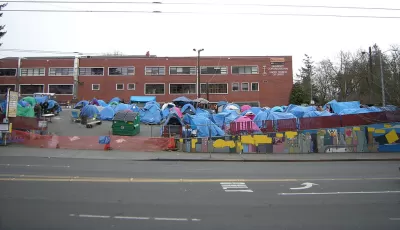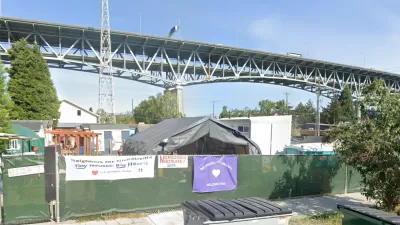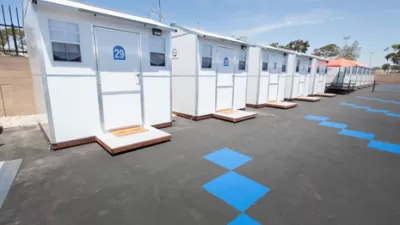Homeless villages aren't hotbeds of crime, according to recent analysis. Rather, they can be part of a "crime prevention ecosystem."

"[A] Guardian investigation in two US cities where such highly organized homeless villages are common, Seattle and Portland, found that their presence was not generally accompanied by a rise in crime in their neighborhoods," reports Thacher Schmid. "In fact, crime was likelier to go down."
The Guardian analysis backs up statements by researchers from George Washington University and the Center on Juvenile and Criminal Justice, as quoted in the article.
That being said, "[t]here is a distinction between these villages and the ad hoc, curbside agglomerations of tents and tarps that have come to symbolize the surging homelessness crisis in many cities across the western US," according to Schmid. Homeless villages are sanctioned, to varying extents, "are largely self-governing, and have defined boundaries and codes of conduct."
It's also worth noting that the Guardian used public crime statistic dashboards (Seattle and Portland) to conduct the analysis, exhibiting yet another productive application for municipal data sharing platforms.
FULL STORY: No link between homeless villages and crime rates, Guardian review suggests

Planetizen Federal Action Tracker
A weekly monitor of how Trump’s orders and actions are impacting planners and planning in America.

Map: Where Senate Republicans Want to Sell Your Public Lands
For public land advocates, the Senate Republicans’ proposal to sell millions of acres of public land in the West is “the biggest fight of their careers.”

Restaurant Patios Were a Pandemic Win — Why Were They so Hard to Keep?
Social distancing requirements and changes in travel patterns prompted cities to pilot new uses for street and sidewalk space. Then it got complicated.

Platform Pilsner: Vancouver Transit Agency Releases... a Beer?
TransLink will receive a portion of every sale of the four-pack.

Toronto Weighs Cheaper Transit, Parking Hikes for Major Events
Special event rates would take effect during large festivals, sports games and concerts to ‘discourage driving, manage congestion and free up space for transit.”

Berlin to Consider Car-Free Zone Larger Than Manhattan
The area bound by the 22-mile Ringbahn would still allow 12 uses of a private automobile per year per person, and several other exemptions.
Urban Design for Planners 1: Software Tools
This six-course series explores essential urban design concepts using open source software and equips planners with the tools they need to participate fully in the urban design process.
Planning for Universal Design
Learn the tools for implementing Universal Design in planning regulations.
Heyer Gruel & Associates PA
JM Goldson LLC
Custer County Colorado
City of Camden Redevelopment Agency
City of Astoria
Transportation Research & Education Center (TREC) at Portland State University
Camden Redevelopment Agency
City of Claremont
Municipality of Princeton (NJ)





























